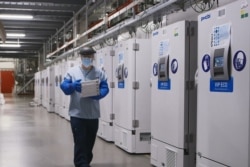Drug-makers Pfizer and BioNTech said they are “within days” of seeking emergency use authorization for their COVID-19 vaccine from the U.S. Food and Drug Administration (FDA).
Pfizer, an American company, and its German partner BioNTech said final results from the large Phase 3 study show the vaccine to be 95 percent effective against COVID-19.
The drug-makers said there were 170 confirmed cases of COVID-19 in the study of 43,000 volunteers. Among the confirmed cases, eight received the experimental vaccine and 162 received a placebo – a shot with an inactive substance.
The FDA only requires that a vaccine be at least 50 percent effective to be considered for emergency use. The agency also wants the drug-makers to present two months of safety data from the trials, which Pfizer said it had done.
Pfizer and BioNTech added that there were no serious safety concerns. They reported that the shot was also more than 94 percent effective in adults over the age of 65, a high-risk group.
Andrew Hill is a researcher at the University of Liverpool’s department of pharmacology. He told Reuters, “The 94 percent protection for older people is key. This is the evidence we needed to ensure that the most vulnerable people are protected.”
Moderna, another American drug-maker, reported this week that early results showed its experimental vaccine to be 94.5 percent effective against COVID-19.
Neither company has published the results in scientific papers. But they are ready to share the information with the FDA and other regulatory agencies around the world.
Both vaccine candidates use a new technology known as messenger RNA, or mRNA. To make an mRNA vaccine, scientists create a genetic material that directs the human body to produce antibodies that can recognize and destroy the new coronavirus. The new technology lets drug-makers develop and manufacture new treatments faster than traditional vaccines.
Dr. Ugur Sahin is the chief executive co-founder of BioNTech. He said, “These achievements highlight the potential of mRNA as a new drug class.”
He added, “We will continue to work with our partners and governments around the world to prepare for global distribution in 2020 and beyond.”
What’s next?
The two drug-makers said they could have as many as 70 million shots ready by the end of this year with the FDA’s emergency approval.
Both vaccines require two shots. That means 35 million people could receive them by the end of 2020. Health officials expect the first treatments to be given to health care workers and other high-risk groups.
Pfizer and BioNTech also reported they could produce up to 1.3 billion treatments in 2021. Moderna said it could have 1 billion available next year.
Pfizer is also developing temperature-controlled containers to ship its vaccine at minus-70 degrees Celsius. These containers can also be used for storage by refilling with dry ice.
Moderna says its vaccine can be kept at temperatures of 2 to 8 degrees Celsius for 30 days. They can be stored for up to 6 months at minus-20 degrees Celsius.
The two vaccine announcements have raised hopes as the health crisis worsens in many parts of the world. The virus has now infected nearly 56 million people and killed more than 1.3 million worldwide.
I'm Mario Ritter, Jr.
Hai Do wrote this story for Learning English. Ashley Thompson was the editor.
_______________________________________________________________
Words in This Story
phase - n. a step in a process
regulatory - adj. concerned with making official rules
highlight - v. to direct attention to
potential - n. a quality that something has that can be developed to make it better
global - adj. involving the entire world
distribution - n. the act of delivering something to people







